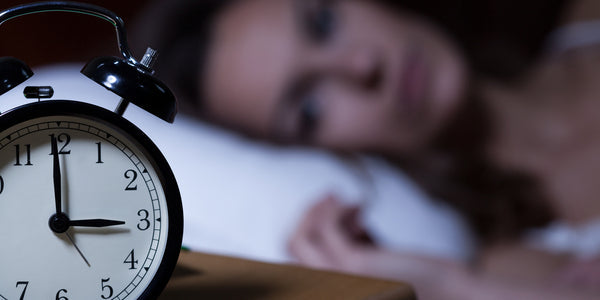
Menopause is caused by the natural decline of estrogen and progesterone that comes with aging. This decline is at the core of menopausal symptoms, including hot flashes, mood swings, night sweats, and weight gain. Poor sleep quality and insomnia may run parallel.
Women can start experiencing these symptoms during perimenopause, or also known as the "menopause transition." This means perimenopausal women may also start struggling to achieve adequate sleep, or as early as age 40.
Find out the links between menopause, insomnia, and sleep disturbances and how to improve sleep during this natural time of change.
Menopause, Hormone Changes & Sleep
In 2017, the Centers for Disease Control and Prevention released findings regarding sleep duration and quality of menopausal women. It included data on women aged 40 to 59.
Specific findings included:
• Perimenopausal women (56.0%) were more likely than postmenopausal (40.5%) and premenopausal (32.5%) women to sleep less than 7 hours.
• Postmenopausal women were more likely than premenopausal women to have trouble falling asleep (27.1% compared with 16.8%, respectively). They also had difficulty staying asleep (35.9% compared with 23.7%), four times or more in the past week.
• Postmenopausal women (55.1%) were more likely than premenopausal women (47.0%) to not wake up feeling well rested 4 days or more in the past week.
To sum it up, perimenopausal sleep problems include short sleep duration. Women in post menopause mostly had trouble falling and staying asleep, as well as achieving restful sleep.
Causes of Poor Menopausal Sleep
Aging is a risk factor of poor sleep within itself. For instance, aging increases the risk of a number of health conditions that may impede on sleep quantity and quality. These include obesity, sleep apnea, and arthritis. Medications, stress, and changes in circadian rhythms can disrupt sleep, too.
Add on menopause, women may struggle with good sleep even more. Menopausal sleep problems can be influenced by a number of causes. These often include compounding hormonal changes, menopausal symptoms, and mental health risks during the stages of menopause.
• Hormonal changes: In addition to managing menstrual cycles, estrogen and progesterone play a role in sleep. Their declining levels can negatively impact sleep cycles.
• Menopausal symptoms: Hot flashes, night sweats, and mood swings can all make it difficult for a good night's sleep.
• Mental health: Menopausal women often experience changes in mental health, including depression and anxiety. Other stress stemming from work, retirement, or children moving out can also make it difficult to fall and stay asleep.
How Can I Get Better Sleep During Menopause?
Despite the greater risk of inadequate sleep, there are steps menopausal women can take to get a better night's rest.
1. Consult with a doctor.
First and foremost, consult with a doctor for professional guidance. They can offer safe, yet effective treatments for menopause and help target underlying health conditions.
A doctor may recommend hormone therapy to ease menopausal symptoms, which may successively lead to better sleep cycles. Other medications and supplements may also be of benefit, including an antidepressant and melatonin.
2. Stay consistent with bedtimes.
A bedtime helps to keep sleep cycles regular and consistency is key to do so. When building a bedtime routine, so aim for a specific bed and wake-up time on a regular basis.
Plan a bedtime to align with the National Sleep Foundation's recommendation of seven to nine hours of sleep. For instance, head to bed no later than midnight if planning to wake up at seven the following morning. This helps ensure achieving the minimum recommended seven hours.
3. Ensure proper sleep conditions.
While sleep conditions can vary, sleep experts suggest a bedroom should be between 60 to 67°F. Keeping the room dark and cool helps regulate body temperature and lower the risk of night sweats.
Bedrooms should be free of any clutter and distractions. Mattress and pillows should feel comfortable and supportive, along with free of any allergens.
3. Relieve stress before bedtime.
Stress may be at the core of menopause and sleep deprivation. So rather than stressing over not being able to fall asleep, prime sleep cycles by practicing relaxation techniques.
Relaxation exercises for falling asleep can quiet the mind and calm the body. Other ways to relieve stress may including taking a warm bath or reading a book. Truly, practice positive coping techniques that work best for you.
Writing down worries can also ease nagging thoughts, worries, and anxieties that keep the mind awake and prevent sleep. Continue to write until the mind becomes blank and eyes start to become heavy. End with statements such as "I feel better and this can wait until tomorrow."
4. Exercise throughout the day.
Exercise may combat against insomnia by facilitating an earlier sleep onset, longer night's rest, and higher quality of sleep. It can also decrease feelings of depression and anxiety that often keep women up throughout the night.
Aim for at least 150 minutes of exercise weekly, or 30 minutes most days of the week. Any sort of movement can be beneficial, including a brisk walk in the morning or on lunch breaks.
5. Consider dietary habits.
A healthy diet can positively influence sleeping patterns in a number of ways. One of which includes weight management, in turn lowering the risks of chronic diseases that can impede on good sleep.
A low-glycemic diet can also stave against hot flashes and night sweats, thus prompting eliminating culprits of poor sleep. Overall, place the focus on whole foods rich in fiber, lean protein, and healthy fat.
Other dietary factors include avoiding large meals, caffeine, alcohol, and spicy foods leading up to bedtime.







